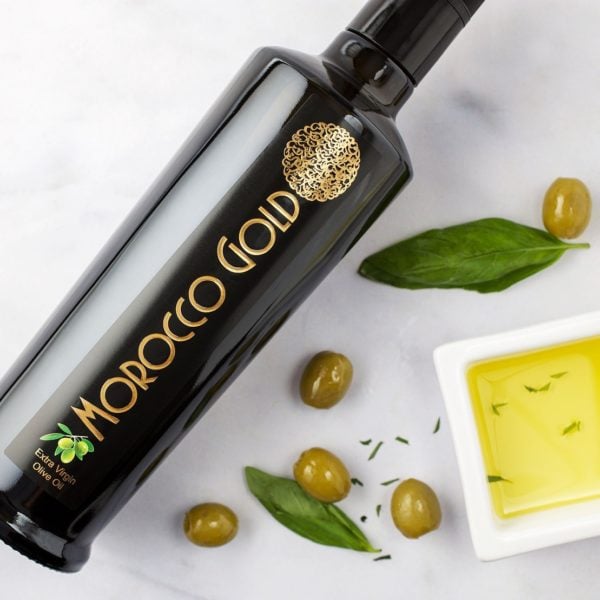
Contents
- What Is Extra Virgin Olive Oil?
- Best Extra Virgin Olive Oil Production
- Why Choose Extra Virgin Olive Oil?
- Best Extra Virgin Olive Oil Is The Healthiest Fat on Earth
- What Makes Extra Virgin Olive Oil So Healthy?
- What Are Polyphenols?
- Polyphenols In Extra Virgin Olive Oil
- Where Morocco Gold Extra Virgin Olive Oil Comes From?
- Harvesting Morocco Gold Extra Virgin Olive Oil Olives
- Harvesting For Best Quality Extra Virgin Olive Oil
- What Determines The Polyphenols In Morocco Gold Extra Virgin Olive Oil?
- Types Of Polyphenols
- The Polyphenols Present In Morocco Gold Extra Virgin Olive Oil And What They Do
- Polyphenol 1 : 3,4 DHPEA-EDA, The Endothelium, Blood Vessels and Endothelial Cells
- Polyphenol 2 : Hydroxytyrosol In Extra Virgin Olive Oil
- Polyphenol 3 : Lignans In Extra Virgin Olive Oil
- Polyphenol 4 : Ligstroside-Aglycone (LA) And Treatment Of Osteoarthritis
- Polyphenol 5 : Oleuropein Aglycone (OA)
- Polyphenol 6 : p-HPEA-EDA (Oleocanthal) In Extra Virgin Olive Oil
- Polyphenol 7 : Tyrosol : A Key Polyphenol In Morocco Gold Extra Virgin Olive Oil
- How To Reap The Health Benefits From Extra Virgin Olive Oil?
- Why Buy New Harvest Extra Virgin Olive Oil?
- Morocco Gold Extra Virgin Olive Oil Tastes Great!
- How To Taste Extra Virgin Olive Oil
- The Versatility Of Morocco Gold Extra Virgin Olive Oil
What Is Extra Virgin Olive Oil?
Extra Virgin olive oil is a wholly natural, unrefined oil and the highest quality olive oil you can buy. Genuine extra virgin olive oil is rare and as a result is slightly more expensive. The definition of extra virgin olive oil is very precise regards production methods, taste and chemical composition.
To qualify as extra virgin olive oil, it is an olive oil of less than 0.8% acidity and has no taste defects. In practice, the very best extra virgin olive oils have acidity levels much lower. Morocco Gold extra virgin olive oil is consistently below 0.5%, normally around 0.25% to 0.3% depending on the weather conditions throughout the growing season.
Extra virgin olive oil is completely natural. It is not treated with chemicals or altered by temperature. It is typically has a golden-green colour, with a distinctive fresh, green flavour and a light peppery finish.
Best Extra Virgin Olive Oil Is Single Estate. This means that it is from one source and is not mixed or blended with other olive oils, (even if they are extra virgin olive oil).
Best Extra Virgin Olive Oil Production:
How the fruit was grown, harvested and transported, how it was pressed into oil, and how the oil was packaged and bottled all contribute to ensure extra virgin olive oil like Morocco Gold is the best quality olive oil you can buy.
The best extra virgin olive oils are produced when the olives are young and green. They are hand-picked and handled with care and attention throughout the harvesting process. The olives are pressed using solely mechanical means within 24 hours of picking at temperature of below 28 º C.
Why Choose Extra Virgin Olive Oil?
Extra Virgin olive oil is the go-to cooking oil for health-conscious food lovers and those wanting to cook healthily and lose weight. Mostly everyone who has ever read about a diet or has looked up for healthy food recipes is familiar with extra virgin olive oil and its heart-healthy properties. But the wonders of extra virgin olive oil like Morocco Gold are much more than just protecting the heart from risks of attacks. The demand for high quality extra virgin olive oil has increased in the last few years, thanks to growth in the health-conscious populace of the world.
There are many reasons why people choose extra virgin olive oil like Morocco Gold over other types of oils. Whether this is extra virgin olive oil as part of a healthy diet, extra virgin olive oil for its delicious taste or extra virgin oil because of its now well-researched and documented health benefits. Extra Virgin Olive Oil is probably the most extensively researched foodstuff on the planet and the health benefits are evidence based.
Best Extra Virgin Olive Oil Is The Healthiest Fat on Earth :
Fats in the diet are highly controversial. You will see people arguing about animal fats, seed oils and almost everything in between. But one of the few fats that most people agree is healthy is extra virgin olive oil. This oil, part of the Mediterranean diet, is a traditional fat that has been a dietary staple for some of the world’s healthiest populations. There is now considerable scientific research behind the health effects of olive oil. These studies show that the fatty acids and antioxidants in it have some powerful health benefits.
What Makes Extra Virgin Olive Oil So Healthy?
Extra virgin olive oil, sunflower oil and canola oil are high in monounsaturated fat (the healthy-for-you kind of fat). So what would put extra virgin olive oil above the others if their fat make-up so similar? It’s not just about the kind of fat molecules that they are made up of, extra virgin olive oil has some extra magic. The biggest thing that makes extra virgin olive oil so healthy is its unique disease-fighting component – polyphenols.
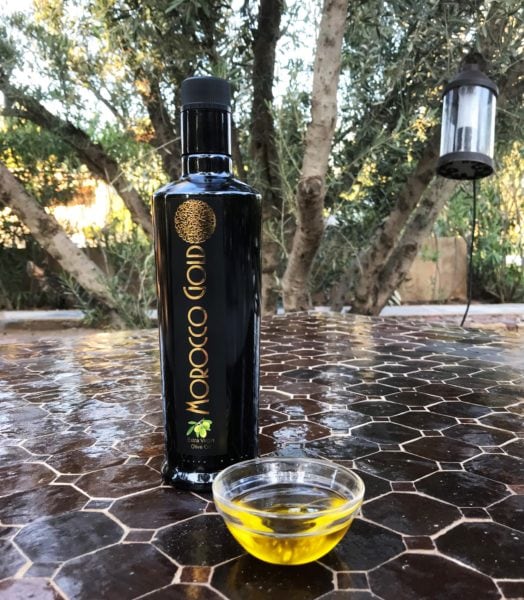
What Are Polyphenols?
Polyphenols are a group of over 500 phytochemicals, which are naturally occurring micronutrients in plants. These compounds give a plant its colour and can help to protect it from various dangers. When you eat plants with polyphenols, you reap the health benefits as well.
Thanks to the recent spotlight on the Mediterranean Diet, extensive research has been done on the phytonutrient composition of extra virgin olive oil. What has been discovered is an extensive list of phytonutrients; one of the most praised is its polyphenols. The amount of polyphenols found in extra virgin olive oil is truly amazing!
Polyphenols In Extra Virgin Olive Oil
Polyphenols are a key component in extra virgin olive oil and are considered to be one of the best health enhancing benefits within the oil. Polyphenols are a potent antioxidant – one that can decommission a nasty molecule in your body called free radicals. Free radicals can ricochet around inside your body and harm good cells. Antioxidants, such as the polyphenols found in extra virgin olive oil, work to neutralize free radicals, protecting the body from their harmful antics. It’s also thought that polyphenols contribute to keep the body being in an anti-inflammatory state. This is also associated with a lower risk of several chronic diseases.
They also protect the olive oil from oxidative damage and contribute to its superior longevity and shelf life. They also affect the taste of extra virgin olive oil and give it its distinctive bitter flavour.
The European Food Safety Authority has now approved health claims for extra virgin olive oils with a polyphenol content of more than 250mg / kg. The polyphenol content in Morocco Gold extra virgin olive oil is normally well above this level.

Where Morocco Gold Extra Virgin Olive Oil Comes From?
The Morocco Gold olive growing area is around 200 kms and about 4 hours drive north east from Marrakesh in the wonderfully picturesque Taounza Valley which is part of the Beni Mellal Region. This elevated valley lies in the foothills of the Atlas Mountains with altitude varying between 700m and 900m along its 40kms. This creates its own micro-climate and terroir with temperatures generally 2c below the coastal plain in the daytime and 5c at night-time. These differences create unique high-quality olive growing conditions which are concentrated in the eastern half of the valley.
Harvesting Morocco Gold Extra Virgin Olive Oil Olives
Harvesting olives re-enacts an event that has taken place for centuries. The farmers and their families have nurtured their olive trees and their harvest with care and attention for generations.
Fruiting sizing and assessment of the maturity of the olive is carried out prior to harvesting. The planned date of harvest is agreed based on the maturity of the olives, also the generations of experience of the olive farmers. Morocco Gold olives are hand-harvested early in the season when the fruit is young.
The specialist team of harvesters consists of local women from the valley who bring a special degree of diligence to the harvesting process to ensure that only the best olives go not Morocco Gold extra virgin olive oil. Nets and tarpaulins are placed on the ground to avoid contact between the olives and the ground. Harvesting is carried out by hand. Recent reports have highlighted issues of mechanized harvesters devastating bird populations during picking.
Harvesting For Best Quality Extra Virgin Olive Oil
Determining when to harvest is not an exact science. It is an amalgam of a number of factors such as the desired olive oil yield, intended level of anti-oxidants, and, of course, the desired flavour profile.
It is important to strike the right balance for Morocco Gold customers. Our aim is to combine the taste characteristics of a premium extra virgin olive oil, young and fruity, with the health enhancing polyphenols to create an extra virgin olive oil that is well balanced and not too ‘aggressive’ when taken on its own.
Our olives are picked slightly earlier in the season to maximise the polyphenol content of our oil. This does however mean that the yield – the quantity of oil delivered during pressing is considerably less, although of a higher quality. (see ripening graph)
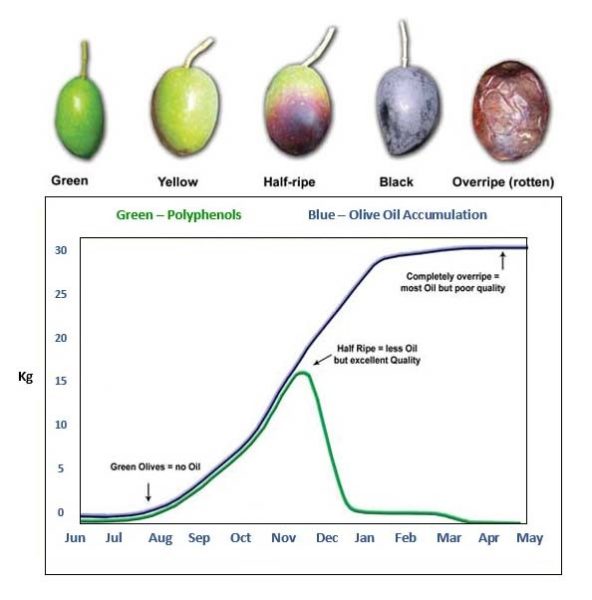
A key to achieving this balance is the generations of experience of our olive growers, the care and attention the pay to their crop throughout the whole growing season and the dedication and attention to detail paid during the harvesting process.
We are pleased to say our latest harvest is the best specification we have achieved, with a low acidity of 0.2% and a high polyphenol count of 644mg/kg.
What Determines The Polyphenols In Morocco Gold Extra Virgin Olive Oil?
The high polyphenol content of Morocco Gold extra virgin olive oil is dependent on three factors. First is the variety of the olive, secondly the climate and terroire of the growing region and thirdly the actual time in the growing season that the crop is harvested.
Morocco Gold is pressed from the Picholine Marocaine, the only type of olive to go into Morocco Gold. Oil from this variety is renowned for it’s high polyphenol count, oxidative stability and longevity.
Our olives are grown in a valley that is about 2,000 feet above sea level. This helps to create the additional climatic challenges that encourage polyphenol uptake within the olive tree. It is also an area with naturally occurring high phenols in the soil itself.
In soils, phenols are released over extended period of time from decomposing plant materials. This causes complex organic compounds to be slowly oxidized or to break down into simpler forms of sugars, amino sugars, aliphatic and phenolic organic acids. These are further transformed into microbial biomass or are reorganized, and further oxidized, into humic assemblages (fulvic and humic acids), which bind to clay minerals.
Thirdly, our olives are picked when the fruit is young and green. As the olives age on the tree, the colour of the olive changes to red and then black, the size of the olive increases thus producing more oil, but the polyphenol level decreases. There is a great deal of expertise within the farming community where we source our oil to ensure that the harvest is collected at the optimum time to maximise the polyphenol level.
Types Of Polyphenols
There are a number of different types of polyphenols in extra virgin olive oil, including oleuropein, tyrosol, hydroxytyrosol, oleocanthal and oleacein. Each are considered extremely strong antioxidants, and are linked to a number of different benefits, including:
- Maintenance of normal blood pressure
- Keeping the upper respiratory tract healthy
- Protecting proteins in the brain that are involved in memory, learning and thinking
- Helping to keep blood sugar under control
- Treating the symptoms of and/or preventing type 2 diabetes
- Protecting blood lipids from oxidative damage
- Acting as an anti-inflamatory
The Polyphenols Present In Morocco Gold Extra Virgin Olive Oil And What They Do
We are delighted to say the total polyphenol count in our latest harvest of Morocco Gold extra virgin olive oil is:
| 3,4 DHPEA-EDA | 85 mg/kg |
| Hydroxytyrosol | 5 mg/kg |
| Lignanes | 26 mg/kg |
| Ligstroside aglycone (p, HPEA-EA) | 20 mg/kg |
| Oleuropein aglycone (3,4 DHPEA-EA) | 71 mg/kg |
| Oleocanthal p, HPEA-EDA | 65 mg/kg |
| Tyrosol | 372 mg/kg |
| Polyphenols Total | 644 mg/kg |
Polyphenol 1 : 3,4 DHPEA-EDA, The Endothelium, Blood Vessels and Endothelial Cells
Recent studies have shown that 3,4-DHPEA-EDA helps to protect the endothelium and endothelial cells against inflammation and damage.
Almost all tissues depend on a blood supply, and the blood supply depends on endothelial cells, which form the linings of the blood vessels. Endothelial cells have a remarkable capacity to adjust their number and arrangement to suit local requirements. They create an adaptable life-support system, extending by cell migration into almost every region of the body.
Polyphenol 1: 3,4 DHPEA-EDA, The Endothelium, Blood Vessels and Endothelial Cells
Recent studies have shown that 3,4-DHPEA-EDA helps to protect the endothelium and endothelial cells against inflammation and damage.
Almost all tissues depend on a blood supply, and the blood supply depends on endothelial cells, which form the linings of the blood vessels. Endothelial cells have a remarkable capacity to adjust their number and arrangement to suit local requirements. They create an adaptable life-support system, extending by cell migration into almost every region of the body.
Endothelial cells form the barrier between vessels and tissues. They control the flow of substances and fluid into and out of a tissue. An impaired function can lead to serious health issues throughout the body. Endothelial cells line blood vessels and lymphatic vessels, they are found exclusively in vascularized tissue.
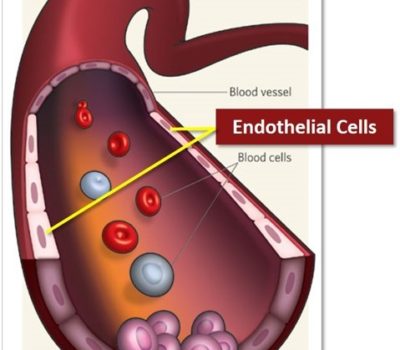
Endothelial cells are nearly ubiquitous throughout the body. If it were not for endothelial cells extending and remodelling of the network of blood vessels, tissue growth and repair would be impossible.
However, there are two major instances where dysfunction of endothelial cells is involved in pathogenesis of a medical condition. First, in coronary artery disease, endothelial cells are damaged. So the generation of new vascular cells to restore organ function following a myocardial infarction is of high research interest. Another example is atherosclerosis, where endothelial dysfunction arising from chronic inflammation within the arterial wall causes a pathological change of blood vessels.
Source: www.researchgate.net
Polyphenol 2 : Hydroxytyrosol In Extra Virgin Olive Oil
Hydroxytyrosol has a potent antioxidant activity. It has one of the highest know ORAC (oxygen radical absorbance capacity) results known for a natural antioxidant. ORAC is a method used to determine the antioxidant capacity of a food or chemical substance.
There is also evidence related to the health benefits of hydroxytyrosol in extra virgin olive oil in the following areas:
Anticancer Activity
Hydroxytyrosol in extra virgin olive oil has the capacity to inhibit proliferation and promote apoptosis of several tumour cells.Therefore, it has been suggested that hydroxytyrosol may have anticancer effects.The exact mechanism of these effects is not well defined, and research continues in this space.
Anti-inflammatory Activity
Research has shown that hydroxytyrosol in extra virgin olive oil can reduce the production of cytokine tumor necrosis factor alpha (TNF alpha) in animal models of inflammation. Animal based research has also shown that hydroxytyrosol in extra virgin olive oil may be able to reduce acute inflammation and associated pain.
Antimicrobial Activity
In vitro experiments have shown that hydroxytyrosol in extra virgin olive oil has antimicrobial properties against infectious respiratory and gastrointestinal pathogens.It is also known that hydroxytyrosol in extra virgin olive oil has activity against gram positive and gram-negative bacteria. In general, polyphenols have been reported to have wide antimicrobial activity, such as antibacterial, antiviral and antifungal effects.
Antithrombotic Activity
A human study showed that hydroxytyrosol in extra virgin olive oil was able to lower serum thromboxane B2 levels, leading to an anti-aggregatory platelet effect.Other research supports this finding, showing that hydroxytyrosol significantly reduces platelet aggregation.
Antiatherogenic Capacity And Cardioprotective Effect
It is known that hydroxytyrosol in extra virgin olive oil is a powerful scavenger of free radicals which allows for the reduction in oxidation of low-density-lipoproteins (LDL), potentially reducing the risk of atherosclerosis.
Retino-Protective Activity
Hydroxytyrosol in extra virgin olive oil may play a role in reducing the risk of age-related macular degeneration, however further research is required in this area to determine the exact mechanism and importance of this preliminary research finding.
Skin Related Effects
It is believed that oxidative stress plays a major role in UVA-induced protein damage to the skin.Preliminary research shows that hydroxytyrosol in extra virgin olive oil can work to prevent such UVA damage in melanoma cells.
Polyphenol 3 : Lignans In Extra Virgin Olive Oil
In new research, Javier Menendez from the Catalan Institute of Oncology and Antonio Segura-Carretero from the University of Granada in Spain led a team of researchers who set out to investigate which parts of extra virgin olive oil were most active against cancer.
The research findings provided new insights on the mechanisms by which good quality extra virgin olive oil rich in polyphenols might contribute to a lowering of breast cancer risk.
Menendez said, “Our findings reveal for the first time that all the major complex phenols present in extra-virgin olive oil drastically suppress overexpression of the cancer gene HER2 in human breast cancer cells”.
All the fractions containing the major extra virgin phytochemical polyphenols (lignans and secoiridoids) were found to effectively inhibit HER2. He went on, “These findings, together with the fact that that humans have safely been ingesting significant amounts of lignans and secoiridoids as long as they have been consuming olives and extra-virgin oil, strongly suggest that these polyphenols might provide an excellent and safe platform for the design of new anti breast-cancer drugs”.
Polyphenol 4 : Ligstroside-Aglycone (LA) And Treatment Of Osteoarthritis
While information on LA bioactivity is limited, a few years ago, LA was demonstrated to behave as an antioxidant. Furthermore, LA has been shown to have anti-inflammatory effects by controlling and downregulating NF-κB (NF-kB is a type of DNA that is thought to play a pivotal role in the initiation of osteoarthritis and the perpetuation of chronic inflammation in rheumatoid arthritis.
Osteoarthritis is currently, the most frequent cause of pain, deformity and dysfunction in the elderly. It is a late-onset, complex disease of the joint, characterised by progressive failure of the extracellular cartilage matrix (ECM), together with changes in the synovium and subchondral bone.
Two polyphenols from extra virgin olive oil, oleocanthal (OLC) and ligstroside aglycone (LA), plus a chemically modified acetylated ligstroside aglycone (A-LA), and two marine polyunsaturated fatty acids, eicosapentaenoic acid (EPA) and docosahexaenoic acid (DHA), were examined as potential anti-inflammatory agents for OA.
Acetylated ligstroside showed the most promising results for implementation in treating OA as it reduced the expression of pro-inflammatory genes such as inducible nitric oxide (iNOS), matrix metalloprotease-13 (MMP13) and interleukin-1β (IL1B) at both RNA and protein levels; decreased nitric oxide (NO) levels from cartilage explants and also reduced proteoglycan (PG) losses in human osteoarthritic cartilage explants and chondrocytes. These results substantiate the role of polyphenols in OA with implications for therapeutic intervention and our understanding of OA pathophysiology.
Source: https://journals.sagepub.com/doi/full/10.1177/2041731420922701
Polyphenol 5 : Oleuropein Aglycone (OA)
Oleuropein aglycone is one of the chief polyphenols found in extra virgin olive oil. It is getting more and more global attention within the scientific and medical communities due to its biological properties including in anti-Alzheimer’s disease, anti-breast cancer, anti-inflammatory, anti-hyperglycemic effect, and anti-oxidative properties.
OA is derived from the de-glycosylation of oleuropein that exists in the leaves and stones of the olive fruit during the maturation period and is obtained during the pressing of the olives.
Amyloidosis is the name for a group of rare but serious condition caused by a build-up of an abnormal protein called amyloid in organs and tissues throughout the body. The build-up of amyloid protein deposits can make it difficult for the organs and tissues to work properly.
It had been reported that the aglycone form of oleuropein interferes with the build-up of a number of proteins associated with amyloidosis, particularly affecting neuro-degenerative diseases, preventing the growth of toxic oligomers (polymers with relatively few repeating units) and displaying protection against cognitive deterioration.
Or in simple terms, OA provides a protective barrier between health organ cells and harmful amyloid cells.
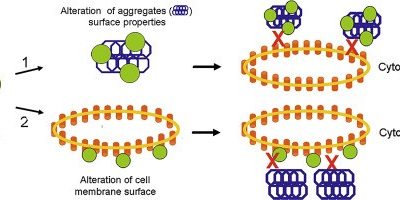
This confirms the polyphenol OA as a promising plant molecule useful against amyloid diseases.
Source: https://www.sciencedirect.com/science/article/abs/pii/S0304416518300850
Oleuropein Aglycone : Other Biological Benefits
Alzheimer’s disease (AD) is a high social impact disease that represents approximately 55–60% of all dementias and affects 6% of the elderly. AD is marked by cognitive degradation with a progressive impact on daily living.
Amyloid β (Aβ) deposits and oligomers are found in AD. Recently reported findings indicate that OA administration to mice can improve memory and behavioural performance by interfering with Aβ build-up. In addition, OA provides neuroprotection to cultured neuronal cells by preventing Aβ build-up, decreasing aggregate cytotoxicity, and counteracting related neuro-inflammation. This suggests that OA administration could be regarded as a new way to prevent and cure AD.
Anti-Breast Cancer Effect
OA has been shown to be the most promising polyphenol in extra virgin olive oil in reducing breast cancer cell activity by supressing the proliferation of Human Epidermal Growth Factor Receptor2 (HER2) breast carcinoma cells.
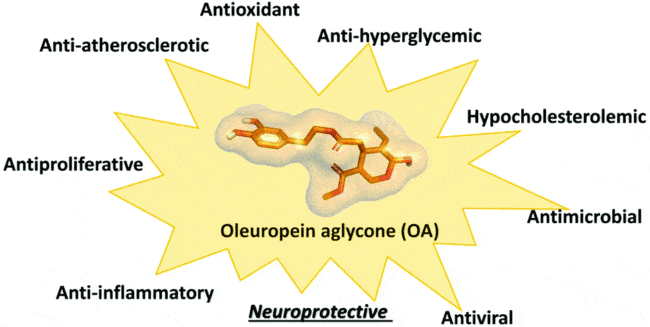
Anti-inflammatory Effect
Inflammation is a complex immune response to pathogens, damaged cells, or irritants, and enables during infection or injury. Pain from inflammation is something most people experience at some point in their lives and a common daily occurrence for many people with arthritis. OA plays an anti-inflammatory role during chronic inflammation and improves tissue damage associated with collagen-induced arthritis.
In addition, OA may be responsible for inhibiting cyclooxygenase (COX) enzymes. COX is an enzyme that forms prostanoids, prostaglandins, prostacyclins, and thromboxanes, which are all contributors to the inflammatory response. Therefore, OA can play an effective role in anti-inflammatory activities.
Anti-Hyperglycemic Effect
Pancreatic amyloid deposits of amylin are characteristic indications of type II diabetes. OA has the ability to intervene with the early stages of build-up of these deposits and hinder the cellular damage they cause.
Anti-Oxidative Effect
Oxidation of low-density lipoproteins (LDL) is deemed to increase the incidence of atherogenesis, which is a potential cause of coronary heart disease. OA was reported to protect LDL in plasma against oxidation which is considered relevant in combating atherosclerotic disease.
Source: https://www.frontiersin.org/articles/10.3389/fchem.2018.00239/full
Polyphenol 6 : p-HPEA-EDA (Oleocanthal) In Extra Virgin Olive Oil
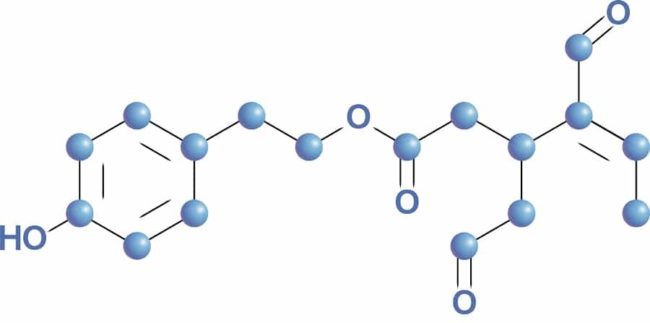
The Oleocanthal molecule is responsible for the peppery / stinging sensation at the back of your throat when you ingest certain extra virgin olive oils. In fact, this is how the molecule got its name, ’oleo’ means oil and ‘canth’ is Greek for stinging or prickly.
The importance and uniqueness of Oleocanthal in extra virgin olive oil is that it has strong antioxidant and anti-inflammatory properties. Its anti-inflammatory action on the body is very similar to ibuprofen, one of the non-steroidal anti-inflammatory drugs most widely consumed.
Non-steroidal anti-inflammatory drugs (NSAIDS) such as aspirin, paracetamol and ibuprofen, can be differentiated from steroids because they have far fewer secondary effects. NSAIDS have proven to have very beneficial effects in diseases that involve chronic inflammation processes, such as degenerative and neurodegenerative illnesses (Alzheimer).
A recent study by Dr Limor Goren explored the effects of oils containing varying levels of oleocanthal on anti-cancer effects. Dr Goren’s study showed that extra virgin olive oil rich in oleocanthal are powerful enough have an effect on cancer cells, while oleocanthal-poor olive oils do not.
The study has shown that oleocanthal specifically kills human cancer cells, but not normal, non-cancerous cells. The authors suggest that this is due to the ability of oleocanthal to induce the death of cancer cells through lysosomal membrane permeabilisation (LMP). (A lysosome is a membrane-bound cell organelle that contains digestive enzymes. Lysosomes are involved with various cell processes. They break down excess or worn-out cell parts. They may be used to destroy invading viruses and bacteria). Permeabilising the lysosomal membrane allows digestive enzymes stored inside this organelle to be released, which preferentially causes cell death in cancer cells.
Polyphenol 7: Tyrosol: A Key Polyphenol In Morocco Gold Extra Virgin Olive Oil
Along with hydroxytyrosol, tyrosol is one of the most abundant polyphenols in extra virgin olive oil, where they occur as such, or in the form of esters of elenolic acid. There is an increasing level of research into these polyphenols and their properties to determine which is the most significant contributor towards the range of health benefits associated with high quality extra virgin olive oil.
Tyrosol is a colourless solid at room temperature, melting at 91–92°C and slightly soluble in water. Hydroxytyrosol on the other hand appears as a clear colourless liquid at room temperature. It is now believed that this affects the rate of ‘uptake’ when ingested with hydoxytyrosol acting more quickly in the gut, however tyrosol accumululating intercellularly over time to provide longer term protection due to its higher concentration and good bioavailability.
Source: www.sciencedirect.com
Its beneficial properties for human health are strongly related to the ability of the molecule to scavenge free radicals and reactive oxygen/nitrogen species as well as to activate endogenous antioxidant systems in the body. Free radical scavenging properties have been convincingly confirmed in studies on rats with alloxan-induced diabetes mellitus.
How To Reap The Health Benefits From Extra Virgin Olive Oil?
Due to the numerous health benefits of extra virgin olive oil it is typically used in cooking.
But did you know that many health experts recommend having a shot of extra virgin olive oil first thing in the morning.
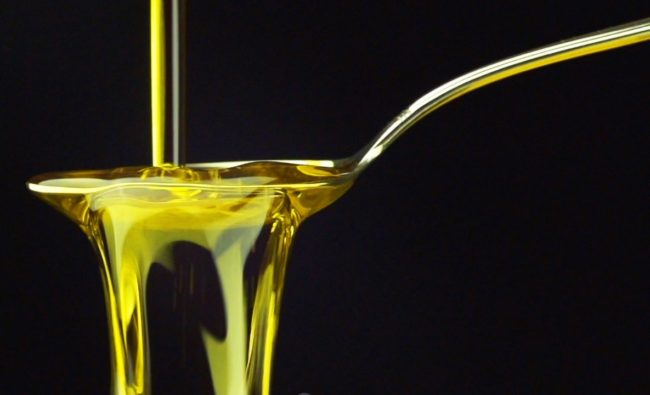
The European Food Safety Authority regulation states that extra virgin olive oil with a polyphenol level of 250mg / kg can make health claims. However it is also very specific about which polyphenols this applies to. It specifically states that this must include hydroxytyrosol and its derivites, (oleuropein and tyrosol). So long as these polyphenols are present, the beneficial effects can be obtained with a daily intake of 20gms of olive oil. One tablespoon (US) equates to 13.3gms, so this is around 2 tablespoons per day.
A study, titled Olive Oil Consumption and Cardiovascular Risk in U.S. Adults, monitored the food intake of nearly 100,000 men and women who were free of cancer, heart disease, and stroke at baseline over a 24 year period.
After adjusting for major diet and lifestyle factors, compared with non-consumers, those with an olive oil intake over 1/2 tablespoon per day in place of other fats such as butter had had a 15% lower risk of any kind of cardiovascular disease and a 21% lower risk of coronary artery disease.
The study showed that small dietary changes can have a measurable impact on health. Replacing as little as 5 grams day (1/3 of a tablespoon or 1/2 a pat of butter) of saturated fats with the equivalent amount of olive oil was associated with 5-7% lower risk of cardiovascular disease and coronary heart disease. Higher olive oil intake was also associated with lower levels of circulating inflammatory biomarkers and a better lipid profile.
The findings, presented at the American Heart Association’s Epidemiology, Prevention, Lifestyle and Cardiometabolic Health Scientific Sessions, are similar to those of the 2013 PREDIMED study which found that people who followed a Mediterranean diet supplemented with extra virgin olive oil for five years had a 30% lower risk of heart attack or stroke and a slower rate of cognitive decline.
Why Buy New Harvest Extra Virgin Olive Oil?
For us at Morocco Gold, providing the freshest extra virgin olive oil to our customers is vital. Freshness is key to the wonderful intensity and richness of flavour, also to providing the health enhancing polyphenols within Morocco Gold extra virgin olive oil.
That is why as a matter of policy, we only sell extra virgin olive oil on our website that is from the latest years harvest. By doing this we are guaranteeing the freshest extra virgin olive oil we have available.
Morocco Gold Extra Virgin Olive Oil Tastes Great!
The taste characteristics of best extra virgin olive oils are:
Fruity : having pleasant fruit flavours characteristic of fresh ripe or green olives
Bitter : with a mostly pleasant acrid flavour sensation on the tongue
Pungent : giving a distinctive peppery sensation in the mouth and throat. This is a sign of abundant nutrients in good, fresh extra virgin olive oil.
Morocco Gold extra virgin olive oil is produced from the Picholine Marocaine cultivar. This gives Morocco Gold it’s distinctive green fruitiness, hints of sweet almonds, fresh turf and a hint of herbs. It has the distinctive ‘pepperiness’ of a fine extra virgin olive oil giving Morocco Gold a clean, well balanced finish.
How To Taste Extra Virgin Olive Oil
Tasting extra virgin olive oil is similar to wine tasting. You want to pour a small amount of the olive oil into a glass and place the bottom of the glass in the palm of your hand to warm up the oil. Gently swirl the glass to release the extra virgin olive oil aromas. Then sniff the olive oil and note the aromas – does it smell like grass or fruit? Next, take a small slurp and suck the extra virgin olive oil to the back of your throat – this spreads the olive oil throughout your palate and helps release the flavours. Lastly, swallow your extra virgin olive oil and take note of the flavours and any bitterness or pungency. A good extra virgin olive oil will give you a slight burn after you swallow. This indicates the olive oil is rich in antioxidants called polyphenols. Bitterness at the back of your tongue tells you it’s pure.
Bitter, pungent and fruity are positive flavour attributes of extra virgin olive oil. You don’t want your olive oil to taste mouldy, yeasty or muddy. If it smells like crayons or stale nuts, it’s likely old and the oil has gone rancid.
The Versatility Of Morocco Gold Extra Virgin Olive Oil
Morocco Gold extra virgin olive oil for cooking is incredibly versatile. It is excellent on its own also as a first class cooking medium and flavouring ingredient. It is becoming more and more popular as a dressing for salads and pasta, for finishing cooked dishes and for dipping with bread and raw vegetables before the meal.
High quality extra virgin olive oils like Morocco Gold are also like fine wines. They are the product of the type of olive, the soil conditions in which the olives grow, the climate and the time the olives are harvested and pressed. This means there are a whole range of flavour profiles.
The particular characteristics of Morocco Gold Extra Virgin Olive Oil, with its distinctive green fruitiness, hints of almond and herbs, fresh turf and the peppery aftertaste, gives a vibrant, well balanced finish. This makes Morocco Gold one of the best extra virgin olive oils for cooking and salad dressings. Here are just some of the ways Morocco Gold extra virgin olive oil can be used.
In Salads
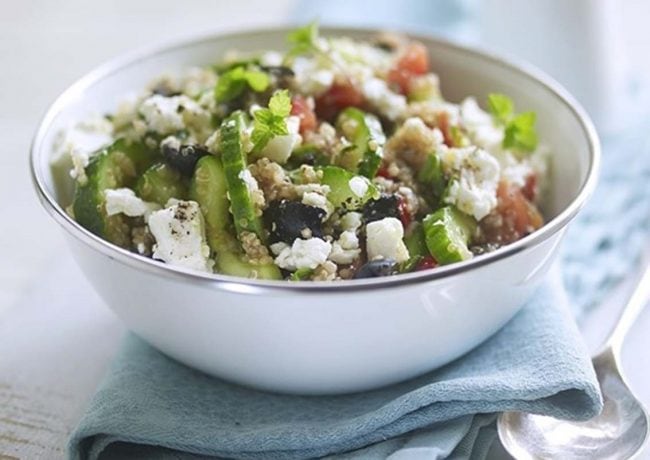
A splash of Morocco Gold extra virgin olive oil mixed with vinaigrette makes salads super healthy and taste delicious.
Perfect As A Dip
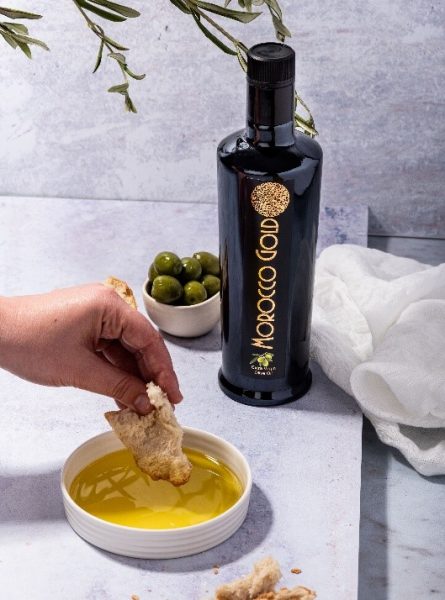
Using extra virgin olive oil like Morocco Gold as a dip for crispy, fresh bread is a great way to get the taste buds going.
In Soups
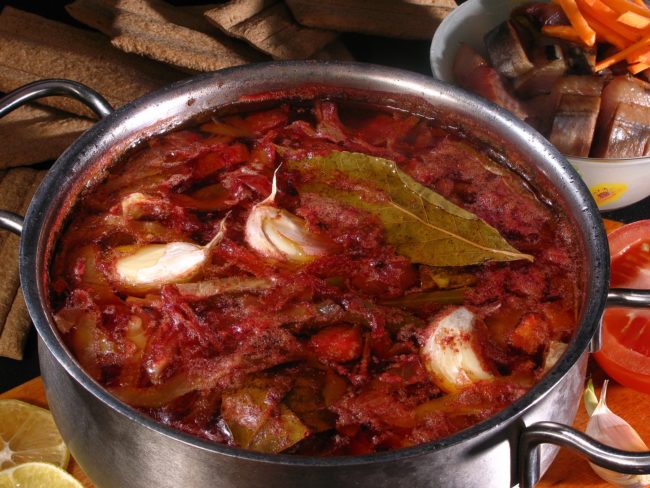
A simple drizzle of this scrumptious oil over your soup can make all the difference. You don’t need much to seek the benefits. It adds a certain ‘je ne sais quoi’ to the hot soup and a special richness.
Excellent For Roasting
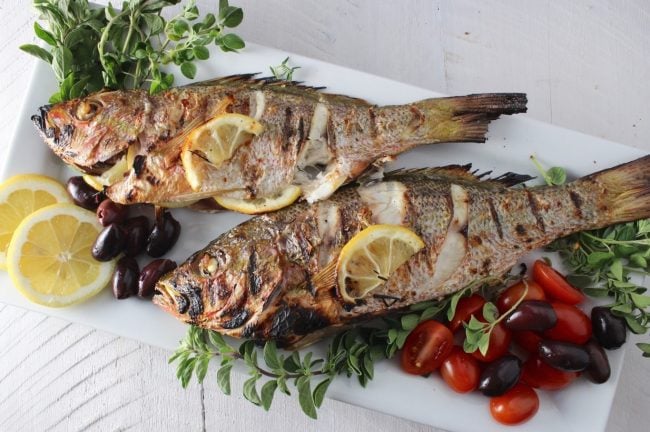
Not only does Morocco Gold extra virgin olive oil help food to cook it also adds a premium, tasty addition to the dish. High quality extra virgin olive oil also has the unique ability to draw out and accentuate the taste of whatever you are preparing.
Pouring Over Hot Food
Remember that heat brings out the flavour of an extra virgin olive oil and so it will smell stronger when it is poured over hot food and its specific flavour characteristics will be more pronounced.
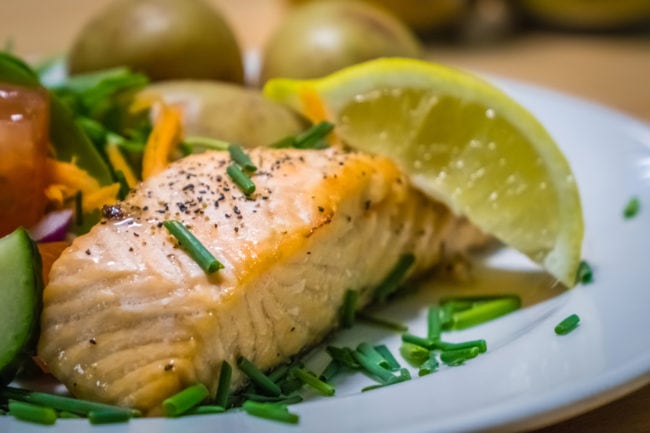
Pour Over Ice Cream

A drizzle of extra virgin olive oil over your ice cream really helps bring out the flavour in the ice cream and adds to the creamy texture. One to try out for sure! Who’d have thought it!
Remember the health benefits of using extra virgin olive oil in cooking and recipes shows are an added bonus.
You can try some of the recipes on our recipes pages.
